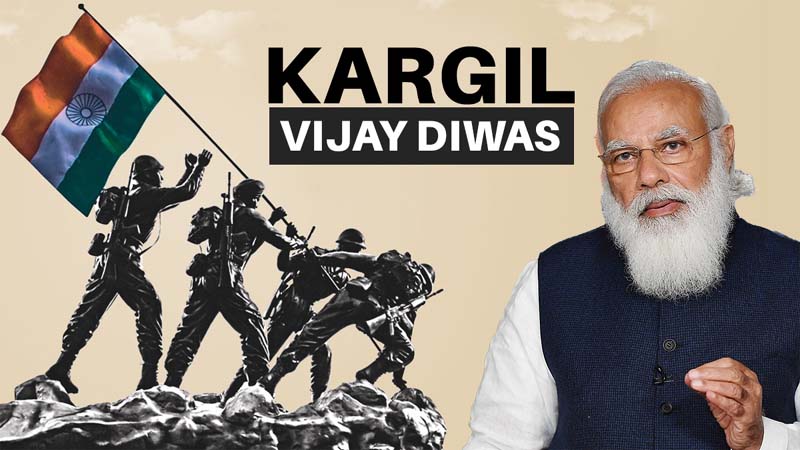On the 25th anniversary of Kargil Vijay Diwas, PM Modi’s poignant address underscored a critical observation: Pakistan’s consistent failure to learn from history, as evidenced by its relentless pursuit of proxy wars and terrorism. PM’s homage to the soldiers who laid down their lives during the Kargil War is a stark reminder of the immense sacrifices made for the nation’s sovereignty. Every word of PM Modi reflects the sentiments of the country. Two and a half decades have passed, but Kargil Vijay Diwas reminds us that the sacrifices made for the nation are immortal; these sacrifices transcend time, leaving an indelible mark on the nation’s consciousness. This reverence for the fallen heroes is not only a tribute but a call to remember and honour their legacy through continued vigilance and strength.
PM’s assertion that Pakistan has “not learned anything from its past” is a pointed critique of its enduring strategy of using terrorism as a tool of state policy. Despite facing numerous defeats and international condemnation, Pakistan continues to foster and export terrorism. This policy, aimed at destabilising India and maintaining relevance in regional politics, has only brought more suffering to the region, including to Pakistan itself. The recent surge in terror incidents in the Jammu region underscores the persistent threat and the need for India to remain ever-vigilant. The message from PM is clear: the perpetrators and patrons of terrorism: and their nefarious designs will never succeed. India’s unwavering commitment to safeguarding its sovereignty and ensuring peace within its borders is beyond doubt. The courage and resilience demonstrated by Indian soldiers during the Kargil War, operating under extreme conditions, serve as a testament to this resolve.
The changes in Jammu and Kashmir post the abrogation of Article 370 are visible on the ground as the region’s newfound trajectory is towards peace and development. The abrogation has paved the way for significant advancements in infrastructure, tourism, and overall governance.
Similarly, Ladakh has gotten focused attention from this regime. In this direction, the announcement of the Shinkun La Tunnel Project in Ladakh is a significant milestone in the region’s development. Constructed at around 15,800 feet, the 4.1 km long Twin-Tube tunnel promises all-weather connectivity to Leh, thereby mitigating the hardships posed by the region’s extreme weather. This project, along with the substantial increase in the budget allocation for Ladakh, exemplifies the government’s commitment to enhancing the ease of living and fostering growth in the UT.
The Kargil War was a hard-learned experience that ultimately transformed the Indian defence outlook. In a rapidly changing global security landscape, the need for a modern and self-reliant defence force cannot be overstated. The prioritisation of defence reforms over the past decade has not only enhanced the capabilities of the armed forces but also positioned India as a notable player in the global arms market. The decision to stop importing over 5,000 weapons and military equipment, coupled with a significant boost in domestic defence production, underscores this transformation.
The PM has rightly emphasised that the victory in Kargil is not merely a political or governmental achievement but a national heritage. This indeed is a festival of pride and self-respect for the country. The victory in Kargil achieved through immense sacrifice and unwavering determination, serves as a beacon of national pride and a reminder of the values that underpin the Indian armed forces. Pakistan’s unyielding proclivity for conflict and terrorism is still on, as is India’s steadfast resolve to counter such threats. As the nation honours the legacy of the Kargil heroes, it also looks forward to a future defined by strength, resilience, and progress.
Trending Now
E-Paper


